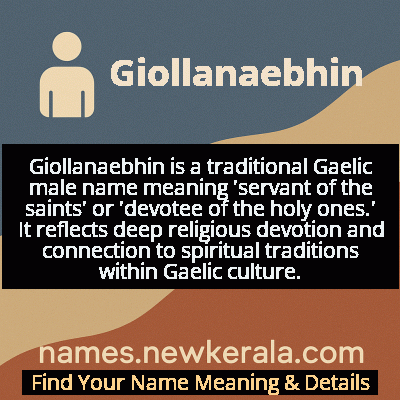Giollanaebhin Name Meaning & Details
Origin, Popularity, Numerology Analysis & Name Meaning of Giollanaebhin
Discover the origin, meaning, and cultural significance of the name GIOLLANAEBHIN. Delve into its historical roots and explore the lasting impact it has had on communities and traditions.
Name
Giollanaebhin
Gender
Male
Origin
Gaelic
Lucky Number
1
Meaning of the Name - Giollanaebhin
Giollanaebhin is a traditional Gaelic male name meaning 'servant of the saints' or 'devotee of the holy ones.' It reflects deep religious devotion and connection to spiritual traditions within Gaelic culture.
Giollanaebhin - Complete Numerology Analysis
Your Numerology Number
Based on Pythagorean Numerology System
Ruling Planet
Sun
Positive Nature
Leaders, ambitious, highly driven, self-reliant, innovative.
Negative Traits
Overly aggressive, domineering, impatient, selfish.
Lucky Colours
Red, orange, gold.
Lucky Days
Sunday.
Lucky Stones
Ruby, garnet.
Harmony Numbers
2, 3, 9.
Best Suited Professions
Entrepreneurs, managers, engineers.
What People Like About You
Courage, determination, leadership.
Famous People Named Giollanaebhin
Giollanaebhin Ó Cléirigh
Scholar and scribe
Preserved important Gaelic manuscripts and religious texts in medieval Ireland
Giollanaebhin Mac Cárthaigh
Religious leader
Founded a monastic school in Munster that educated generations of Gaelic scholars
Giollanaebhin Ó Dálaigh
Poet and bard
Composed religious poetry honoring Irish saints that became part of oral tradition
Giollanaebhin Ó Maolconaire
Historian and genealogist
Documented the lineages of Gaelic noble families and their connections to saintly figures
Name Variations & International Equivalents
Click on blue names to explore their detailed meanings. Gray names with will be available soon.
Cultural & Historical Significance
The name was particularly common among learned classes, including scholars, scribes, and religious figures who maintained Gaelic culture during periods of political change. In a society where literacy and religious devotion were closely linked, bearing the name Giollanaebhin often indicated a family's connection to ecclesiastical institutions or scholarly traditions. The name served as a reminder of the important role that saints played in daily life, from local patron saints to the great missionary figures who shaped Gaelic Christianity.
Throughout the centuries, the name has symbolized the preservation of Gaelic learning and spirituality, particularly during times when these traditions faced external pressures. It represents continuity with Ireland's golden age of saints and scholars, maintaining a connection to a time when Gaelic culture produced remarkable achievements in literature, art, and religious thought.
Extended Personality Analysis
Individuals named Giollanaebhin are typically characterized by deep spiritual awareness and intellectual curiosity. They often possess a natural inclination toward learning and contemplation, with a strong sense of tradition and cultural heritage. These individuals tend to be thoughtful, principled, and guided by a strong moral compass, often showing patience and perseverance in pursuing their goals. Their connection to the name's meaning often manifests as respect for wisdom traditions and a desire to preserve knowledge.
In social contexts, Giollanaebhins are usually reliable and conscientious, valuing deep, meaningful relationships over superficial connections. They may exhibit a quiet confidence and tend to be reflective rather than impulsive in their decision-making. While they can be traditional in their outlook, they often possess the wisdom to adapt timeless principles to contemporary situations. Their combination of spiritual depth and practical intelligence makes them natural mentors and custodians of cultural memory.
These personality traits often lead Giollanaebhins toward professions involving education, spiritual guidance, historical preservation, or cultural work. They typically approach challenges with careful consideration and are known for their integrity and dedication. The name's historical associations with scholarship and devotion often influence the bearer's self-perception, encouraging a life of purpose, service, and intellectual engagement with both tradition and contemporary issues.
Modern Usage & Popularity
In contemporary times, Giollanaebhin remains a rare but culturally significant name, primarily used within Gaelic-speaking communities and by families seeking to preserve Irish cultural heritage. While it never appears on popular baby name lists, it has experienced a modest revival among families with strong connections to Gaelic traditions, particularly in Ireland's Gaeltacht regions and among diaspora communities. The name is most commonly used in its simplified forms like Giolla Naomh or Gilnavin to accommodate modern pronunciation preferences while maintaining its traditional meaning and cultural resonance. Recent years have seen increased interest in traditional Gaelic names as part of cultural revitalization movements, though Giollanaebhin's complexity ensures it remains a distinctive choice rather than a trending one.
Symbolic & Spiritual Meanings
Symbolically, Giollanaebhin represents the bridge between earthly existence and spiritual devotion, embodying the Gaelic concept of serving higher principles while maintaining cultural identity. The name carries connotations of wisdom preservation, spiritual guidance, and cultural continuity. It symbolizes the role of the individual as a custodian of tradition and a link in the chain of cultural transmission. Metaphorically, it suggests a life dedicated to meaningful service, intellectual pursuit, and the maintenance of spiritual and cultural heritage across generations. The name embodies the idea that true devotion manifests through both spiritual practice and practical action in the world.

